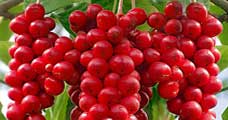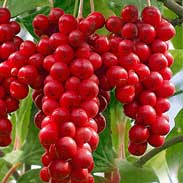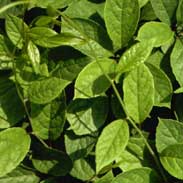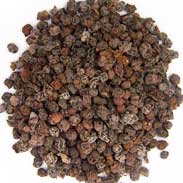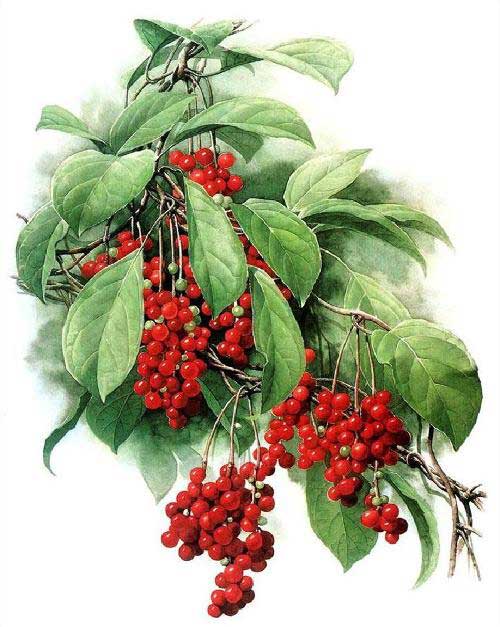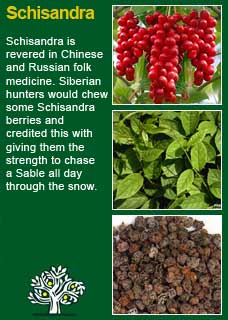
|
|
||||||||
| Our Pages ABOUT CONSTITUTIONAL MEDICINE
|
Schisandra, as used in herbal medicine, is the little red berries that dry black and come from deciduous woody vines that grow prolifically in the forests of the Russian Far East and Northern China.
Schisandra is highly regarded in both Chinese and Russian traditional medicine. The Siberian hunters would chew some Schisandra berries and credited them with enabling them to chase a Sable all day without getting tired! In Chinese medicine Schisandra is very widely used as a tonic (they mostly take it as a tea) for a great variety of conditions and it is considered to be one of the 50 essential herbs.
I did not learn about Schisandra when I first studied herbal medicine and it was only in the mid-1990s that I first heard about it and then started to use it. Schisandra is very highly rated by some influential and persuasive people in the herbal world today and for a few years I used it extensively. However in recent years I have hardly used it at all. In fact my beautiful black berries sitting in their jar are well past their prime by now and only remain as decoration until I need the space (and also to remind me to keep an open mind!) None of this is because I think it does not live up to its promise. I have every reason to think that Schisandra is every bit as good as the Russians and Chinese think it is. My one and only single problem is what it does in a formula, which is that it excessively dominates the taste. Schisandra’s name in Chinese medicine literally translates to ‘five-flavour berry’ meaning that it has sweet, sour, salty, acrid and bitter tastes rolled into one. That would be ok if that were able to blend into the background of other herbs in a mixture but it seems that as soon as you put in enough Schisandra into the mixture for it to do its thing that then every other herb might as well be an innocent bystander because Schisandra is all you seem to get! It doesn’t so much have five tastes as it does have one incredibly strong flavour that gets up close to every single taste bud in your mouth and hits it with a baseball bat. I imagine that if you grew up being familiar with the taste of Schisandra that it could be an entirely different story. I also gather that this is a herb that has a strong history of being used as a ‘single’ meaning it is the only medicine taken at the one time, which makes a lot of sense. My practice of herbal medicine is very much about making formulae of herbs. I often taste them to make sure that I have got the balance right and I have found that this is one of the best ways to improve and develop a sense of what herbs work best together and what are the proportions to use it in relation to others. Ideally you should be able to pick or at least sense each herb in a mixture (even if there are a few of them) and, whilst there will often be a dominant taste, no one of them will be so strong as to obliterate the others. Unfortunately with Schisandra I have not found that to be possible. A fellow herbalist or someone keen on studying herbs might read this and wonder, so why did I write it up if I don't use it? The reason is that I want to advise some common-sense caution to anyone who may likewise take up the use of this herb without fully appreciating how potent its taste can be in tea or tincture. You can give someone the best treatment in the world and they can have it sitting right there in their medicine cabinet but if they need to take it every day for an extended number of days but don't take it because they've developed too much of an aversion to its taste then you haven't done anyone any favours... Edited Note: "Hello! I am writing because I read your monograph about schisandra berry, and your note of caution regarding flavor. From one herbalist to another, I entirely agree. If a client won't take a medicine because the flavor is too bad, it does no favors. I have always been one where, if it is healthy and will reap good benefit, I do not care about flavor and will take it anyway. But upon dipping my toes into the consulting world I have found that the majority of people are not like that (trying to get someone to take a cherry bark tincture is like pulling teeth...). So, I have committed myself to finding flavorful ways to dispense herbal blends that maintain their action. I just wanted to share what I've done with schisandra. I find that for a tea form, mixing it with hibiscus sabdariffa petals and dried orange peel enhance the sweet and tart flavors of the berry. Bringing some licorice into it adds to the sweet, and the mucilage helps tone down the bitter, acrid taste. I've experimented also with creating an herbal syrup, in the same way you'd make an elderberry cough syrup. But I chose schisandra as a dominant ingredient, included just enough elderberry, cinnamon, ginger, clove, hibiscus and orange zest in the honey and water base to make it incredibly flavorful. I am looking into seeing if I can combine the ideas of an alcohol tincture with a glycetract and oxymel (sans vinegar) to create an effective, tasty liquid "extract". I haven't done this yet, though. I just wanted to share these ideas, as I find it profoundly saddening that such a powerful medicine might be passed by based on flavor, alone" Stephany Morgan
Please understand that I cannot personally advise you, including on products or dosage, without seeing you in my clinic but ideas
on how you might find a good herbalist in your area are here. |
|
|
|
© 2011 R.J.Whelan Ltd
